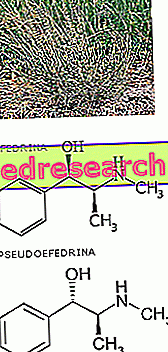Generality
Choline, or Vitamin J, is an amine, as well as an essential coenzyme for the formation of cell membranes and cholinic neurotransmitters (acetylcholine).
It is an organic compound only partially synthesized by the body (thanks to the presence of cobalamin and folic acid); therefore, its contribution should be guaranteed above all through food.

Its importance in the clinical field would be attributed to the precursor role of chemical mediators and structural cellular elements.
The antioxidant, neuroprotective and cardioprotective activities would therefore be at the center of Colina's clinical utility.
Food sources
Choline is a fairly widespread molecule associated with the presence of inositol (a carbocyclic polyol that plays a fundamental role in secondary cell messengers); it is found in large quantities in breast milk, in egg yolk, in soybeans, in wheat germ, in veal and turkey liver, and in brewer's yeast.
Choline is NOT contained in cow's milk and its integrity is seriously compromised by some nerves and drugs: alcohol, caffeine, nicotine, birth control pills etc. It is possible to introduce the choline both DIRECTLY through the food lecithin and DIRECTLY through the integration of phosphatidyl-choline (pills, powder and chloride).
In-depth research is lacking on the potential for intestinal absorption, and on any direct and indirect feed-back on the enteric mucosa resulting from the lack or excess of choline in the body.
Indications
Why is Colina used? What is it for?
Choline is an essential molecule for the human body as it is directly involved in the synthesis of biologically valuable mediators.
More precisely, the Colina:
- Safeguards the appropriate integrity and fluidity of cell membranes, acting as a precursor of a very important membrane phospholipid, Phosphatidylcholine;
- Supports normal cellular vitality, controlling the synthesis of Sphingomyelin; it is known that a deficit of this factor results in a marked apoptotic process;
- It contributes, together with Betaine, to the maintenance of normal cardiovascular function, antagonizing the deleterious effects of the Homocysteine;
- Preserves normal nerve function, intervening in the synthesis of neurotransmitters such as acetylcholine.
In different pathologies such as Alzheimer's or senile dementia, a decrease in the concentrations of this neurotransmitter has been observed.
By virtue of the aforementioned biological functions, Colina could play a precious role in the course of liver pathologies, cognitive and perceptive disorders, dyskinesias, atherosclerosis and cardiovascular pathologies.
Property and Effectiveness
What benefits has Colina shown during the studies?
In addition to the various studies that would have adequately clarified the role of choline as a hepatoprotector, especially with regard to some hepatotoxic drugs, in recent years much of the literature has focused on the "prenatal" role of Colina.
According to experimental studies, in fact, the adequate intake of Colina in the pregnant woman, would determine positive effects on the cognitive, mnemonic and perceptive capacities of unborn children.

Soy Lecithin Granules: Particularly rich source of Colina
These studies, still experimental, should however be supported by human clinical trials, able to adequately clarify the biological effects of adequate supplementation.
The cardioprotective, vasoprotective and anti-inflammatory functions of Colina, on the other hand, would be decidedly more characterized.
The adequate intake of Choline would in fact seem to determine a significant reduction in the concentrations of inflammatory markers - such as Protein C Reactive, ESR and inflammatory cytokines - involved in the genesis of the inflammatory process.
At the same time, the intake of Choline, Vitamin B9, Vitamin B12 and Betaine would seem to result in a valuable vasoprotective activity against atherogenic agents such as homocysteine.
Doses and method of use
How to use the Colina
Considering the guidelines of the Food and Nutrition Board of the Institute of the National Academy of Sciences of the United States - which estimate the amount of Choline to be taken daily in men and women respectively - 550 mg / day and 425 mg / day respectively in most cases the supplement is made with doses of between 300 and 1, 200 mg per day.
Choline is present in supplements in the form of Choline Chloride, Choline Bitartrate or Phosphatidyl Choline.
Side effects
The use of Choline, according to the appropriate indications, has been mostly associated with gas-enteric reactions of little relevance, such as nausea, diarrhea and incontinence.
At doses higher than 3.5 g per day, choline could increase the incidence of hypotension, neurological disorders and changes in liver and kidney function, as well as causing the appearance of an unpleasant fishy odor, linked to the excretion of catabolites.
Curiosity
Among the different metabolic pathways that characterize choline there is also the conversion to trimethylamine N (CH 3 ) 3, an intermediate tertiary amine of animal decomposition and especially of fish.
In this regard, the supplementary or pharmacological intake of choline can determine the characteristic smell of fish to the sweat of those who take it.
Contraindications
When should Colina not be used?
The use of choline is contraindicated in patients hypersensitive to the active ingredient.
Pharmacological Interactions
Which drugs or foods can modify the effect of choline?
The simultaneous intake of Methotrexate could decrease the normal catabolism of choline, while choline could improve, at least in rats, the liver damage induced by the chronic use of this active ingredient.
The cardio- and vaso-protective biological action of Choline could instead be enhanced by the simultaneous intake of Vitamin B6, Vitamin B9 and Vitamin B12.
Precautions for use
What do you need to know before taking Colina?
The use of Choline supplements should be under strict medical supervision in patients suffering from trimethylaminuria, a rare metabolic genetic disorder characterized by increased urinary excretion of choline catabolites.
Trimethylamine, a choline catabolite, would give both urinary and sweat excretions a characteristic fishy smell.
The same precautions should be taken by patients suffering from liver disease, both chronic and acute and viral.



